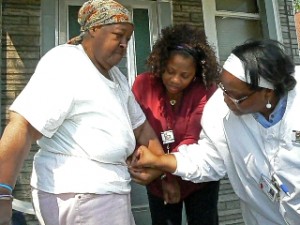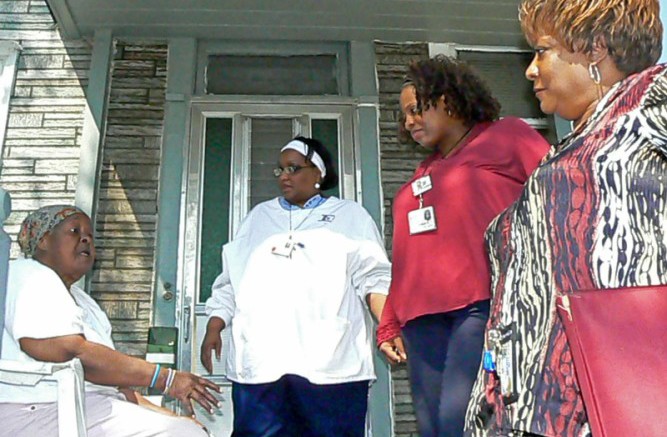West side hospital to offer home visits to help residents manage diabetes
By La Risa Lynch
Shirley Camp was in denial when she was diagnosed with diabetes seven years ago.
And although her husband of 26 years suffers from the disease, Camp, a North Lawndale resident, wanted no part of the finger pricking or the daily insulin injections often associated with the disease.
“By me watching him shoot himself up two or three times a day, I didn’t want to do that. That’s why I was in denial,” she said.
Education about the disease changed Camp’s outlook. She said managing the disease is still a struggle because of her weight, but she tries to eat more healthy. Now she is on a mission to help others.
Camp is hitting the streets with her story as a community health educator (CHE) for a new initiative to increase diabetes awareness and prevention in her west side community. North Lawndale has one of the highest rates of diabetes in the city, according to Sinai Urban Health Institute (SUHI), an umbrella unit of Sinai Health Systems.
SUHI created the Block by Block North Lawndale Diabetes Community Action initiative that will survey North Lawndale residents about their diabetes risk. The goal is to reduce risk and promote a healthier lifestyle .
North Lawndale, according to a 2003 SUHI study, has a diabetes rate that is 40 percent higher than the city. About 1.5 out of 10 people over the age of 18 in North Lawndale have diabetes. Nearly 95 percent of those are diagnosed with Type II diabetes, the most preventable form of the disease.

Kimberly Felker and Shirley Camp of SUHI’s new diabetes initiative take the waist measure of a North Lawndale resident to determine her risk factor for the disease.
Camp understands why North Lawndale is hard hit by diabetes. She said it’s a community without a grocery store and is peppered with fast food restaurants and corner stores that sell “chips, pop and alcohol.” Camp met her husband at the McDonalds where he worked and she joked that they have been eating “grease” every since.
“Since I know about diabetes, I’m telling everybody, because it is running rampant in the community.” she said.
The confidential survey is targeting homeowners between Roosevelt and Odgen and Homan and Trip. It will collect information on race, age and number of individuals in the households and risk factors such as weight, family history, high blood pressure and high cholesterol.
Survey participants will receive a $15 gift card for completing the survey. The survey telephone hotline will go live the last week in April. To participate call (773) 257-6024.
The survey hopes to identify 287 people at risk for the disease or who have the disease. Those individuals will receive home visits a couple of times a year by community health educators or “block captains.” Block captains will provide diabetes education and create action plans to help residents eat healthier, exercise more and stick to their drug regiment. They will also be referred to clinics, resources and programs to address their needs.
Using block captains will determine if community engagement is a better way to address individuals medical needs, but the goal is to get people to change their behavior that contribute to diabetes, explained Donna V. Werner, the block by block program coordinator.
“It’s really about trying to impact the lives of people one at a time,” Werner said.
Margaret Shepard, also a CHE, knows the consequences of not taking diabetes seriously. Shepard had gestational diabetes, which occurs during pregnancy, and has been a diabetic for 26 years.
Shepard thought the pills prescribed to her was a magic panacea for the disease. So she didn‘t change her diet or exercise which elevated her sugar levels. She was placed on both insulin and pills.
“Now I’m feeling the affects in my body,” Shepard said. “I can no longer see like I used to. I’m feeling tired and sluggish. …These are the things that I can share with people. You don’t have to go through that if you just do the right thing ¾ if you exercise; watch your food intake. It better to do it before you have to.”
Diabetes, she added, is not curable, but manageable. “It has been a life changing experience for me.”
Knowing risk factors such as obesity, high blood pressure and cholesterol are key in diabetes prevention, said Kimberly Felker, another CHE, whose father has the disease. Even a waist circumference over 35 inches can lead to diabetes, “because it squeezes in your pancreas and other organs making them work harder,” Felker said.
More education must be directed at older Blacks who may dismiss diabetes symptoms, like blurred vision or frequent urination, as part of getting older, she added.
“Some people could have diabetes for five or ten years and never know it … because of lack of knowledge [or] they don’t know what to look for,” Felker said.
A possible tell-tell sign, Felker explained, is what is called “dirty necks,” or acanthosis migricans. It is a thick discoloration of skin around the neck that looks similar to elephant skin. She said some people dismiss it as someone’s neck not being cleaned, but is a indication of diabetes.
The condition, Werner added, is often seen in overweight children. “That is definitely a red flag that they should get checked out.”
On Friday, May 28 from 10 a.m. – 4 p.m., Mt. Sinai Hospital will have a diabetes fair held in the hospital’s Glasser Auditorium, 1500 S. California Ave. Admission is free. The event will feature nutrition workshops and several screenings for blood pressure, foot, heart, eye and kidney disease.
For information about the fair, contact Kitty River at (773) 257-5245. For information about the telephone survey, contact SUHI at (773) 257-6024.

Be the first to comment on "Fighting diabetes block-by-block in North Lawndale"